Press releases
Activity report 2023 of the "Road Department" and Territorial Development Funds presented to the Prime Minister
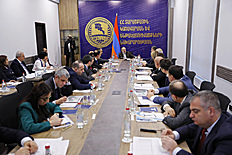 1670x1113px - 759 Kb
1670x1113px - 759 Kb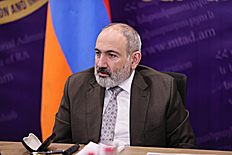 1670x1113px - 652 Kb
1670x1113px - 652 Kb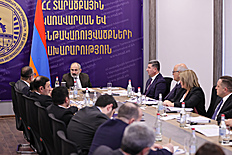 1670x1113px - 835 Kb
1670x1113px - 835 Kb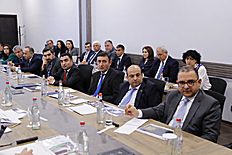 1670x1113px - 643 Kb
1670x1113px - 643 Kb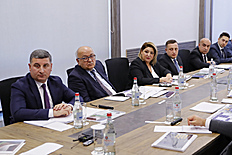 1670x1113px - 649 Kb
1670x1113px - 649 Kb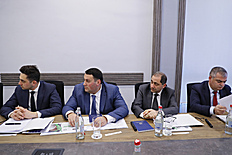 1670x1113px - 632 Kb
1670x1113px - 632 Kb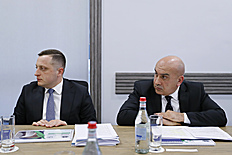 1670x1113px - 506 Kb
1670x1113px - 506 Kb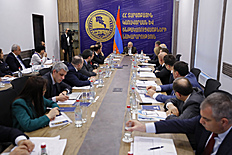 1670x1113px - 735 Kb
1670x1113px - 735 Kb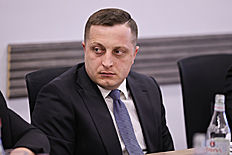 1670x1113px - 556 Kb
1670x1113px - 556 Kb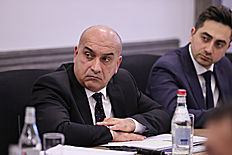 1670x1113px - 535 Kb
1670x1113px - 535 Kb 1670x1113px - 661 Kb
1670x1113px - 661 Kb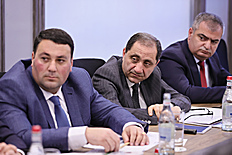 1670x1113px - 645 Kb
1670x1113px - 645 Kb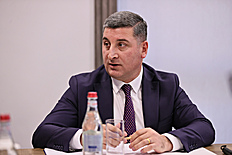 1670x1113px - 576 Kb
1670x1113px - 576 Kb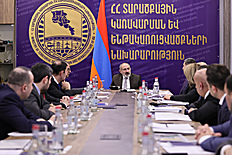 1670x1113px - 883 Kb
1670x1113px - 883 Kb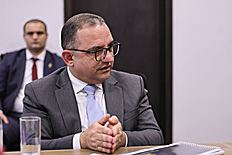 1670x1113px - 602 Kb
1670x1113px - 602 Kb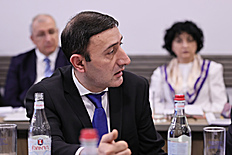 1670x1113px - 575 Kb
1670x1113px - 575 Kb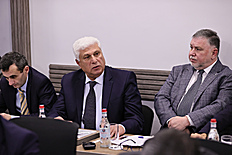 1670x1113px - 715 Kb
1670x1113px - 715 Kb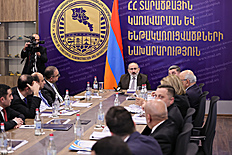 1670x1113px - 998 Kb
1670x1113px - 998 Kb
more 15 photos
Prime Minister Nikol Pashinyan visited the Ministry of Territorial Administration and Infrastructure, where the activity reports 2023 of the "Road Department" and Territorial Development Funds were discussed.
First, Gor Avetisyan, Executive Director of the "Road Department" Foundation and his deputies reported on the works and current programs carried out in the reporting period.
The improvement programs of the road network funded by the state budget of Armenia and the implementation process were reported. According to the officials, large-scale major repair works of roads of state importance were carried out. Accordingly, during the period of 2018-2023, major repairs, reconstruction and construction of road sections with a total length of 1302.4 km were carried out, for which 182.8 billion AMD were allocated. In the course of 2023, major repair, construction and reconstruction works of road sections with a total length of 356 km were carried out. 9,739 road signs and about 173,000 meters of metal barriers were installed within the framework of the infrastructure repair project.
Medium repairs of roads of state importance were also carried out with the financing of the state budget. Accordingly, in the period of 2018-2023, average repair works were carried out on road sections with a total length of 663 km, for which 33 billion AMD was allocated from the state budget of Armenia. In the course of 2023, about 150 km of roads underwent medium repair, which cost 6.5 billion AMD.
The Prime Minister asked how it is decided which road should be repaired in a given year.
Gor Avetisyan noted that with cars equipped with appropriate technical means, as well as with the online system, data is obtained, and by combining these two, decisions are made. "That system even determines the type: major repair, medium repair or repair. Every year we collect information on road condition, roughness, smoothness, potholes, etc. We load everything into the system, which decides what measure should be carried out for that year," said the head of the department.
Responding, the Prime Minister emphasized. "I mean, it's all about electronic data. Very good: We should have a standard here too."
Gor Avetisyan informed that no road repaired after 2018 has been repaired second time until now.
"We have roads the load on which has increased several times. We need a standard, we need to know, both the public and the Government, how long the road should serve us. It is true that we usually think in terms of time, but time is not an objective indicator, because the number of trucks that have traveled that road in the same time period also plays a role. Let's imagine a situation when we introduced this system, set the standard, said: we put this road into operation, so the moment of the next repair of this road should come when, for example, 1,000, 10,000 or 20,000 vehicles with trailers have passed over it, and let's say 50,000 cars. This will help a lot because we are investing these huge funds, it is also a big responsibility. It's good that we are building, but at some point you see an unevenness, you say, maybe we are doing something wrong and this is not what we should be doing. That's why I consider it important, it's a priority, let's set that standard," Nikol Pashinyan emphasized.
The Head of the Government also inquired about the projects implemented with loan and grant funds, in particular, about the course of the North-South project. It is being implemented through multi-tranche financing, divided into separate tranches, within the framework of which separate loan agreements are signed. In this regard, reference was made to the works carried out in the Ashtarak-Talin, Talin-Landjik, Lanjik-Gyumri sections and the works planned for the near future. Details were presented about the process of starting the construction works of Gyumri bypass road section, Sisian-Kajaran 60 km, Kajaran-Agarak 32 km sections.
Prime Minister Pashinyan asked. "By our calculation, when will the Yerevan-Gyumri section of the North-South project be ready?"
It was reported that the said section will be fully ready by the end of 2025, but it is planned to put all the sections into operation this year, except for the 14-15 kilometer section. "In any case, the builders have such an obligation," said Gor Avetisyan.
In response to the Prime Minister's question about starting the construction of the Agarak-Kajaran section, Avetisyan noted that the works are in the starting stage. "Construction started on February 5 according to the contract. In other words, the clock has started working, and the period is three years, that is, a certain process has already started," said the head of the fund.
Details were presented regarding the reconstruction works of the Vanadzor-Bagratashen road. It was noted that the major repair of the 51.74 km long section of the M-6, Vanadzor-Bagratashen road (except for the Odzun intersection) to the Tumanyan-Bagratashen customs checkpoint has been completed. As a result of the repair, the traffic intensity rose from 2800 cars/day in 2014 to 4000 cars/day in 2023. Cargo transportation through the Bagratashen customs checkpoint rose from 0.85 million tons in 2014 to 2.53 million tons in 2022.
Prime Minister Pashinyan referred to the involvement of construction organizations in state and non-state construction projects and the full realization of their potential. "In the process of carrying out state and non-state constructions, is this assessment correct? Have we really discovered the entire construction potential as of now? I mean the workload of construction organizations," asked the Prime Minister.
Minister of Territorial Administration and Infrastructures Gnel Sanosyan noted that the fact that the deadlines of construction works are regularly violated due to the workload of the companies also speaks about it.
"I want to understand, for example, the issue of North-South or the annual 500 km road that we have set up, repaired or built, how much of the sector's potential do we use, specifically, in road construction," asked the Prime Minister.
The head of the "Road Department" noted that all available potential is used.
"That’s what I want to understand. In the beginning, there were rumors about who won the tender, who didn't win the tender, who was whose friend, etc. There is no such company that does not win the tender, if it is objectively capable of it," Nikol Pashinyan noted.
Sargis Baghinyan, Executive Director of the Territorial Development Fund, noted in his turn. "Mr. Prime Minister, the pace of construction has increased so much that we ask construction organizations to participate in our constructions."
For the purpose of ongoing maintenance of interstate and national roads of Armenia, 48 contracts were signed with 34 organizations with a total value of 6 billion 952 million AMD. The work done by the companies is observed online and through visits. In 2023, 3510 defects were recorded by digital control. About 200 million AMD were withheld for not eliminating the recorded defects on time.
Details on the Road Directory application were also provided. It was noted that the application provides operational information on the passability of Armenian interstate and republican roads, hospitals, police departments.
Reference was made to the road safety improvement program of Armenia. It was reported that in 2023, 25 black spots (accident-prone areas) were eliminated. Safety elements have been improved in the road section with a total length of 38.4 km. The project was implemented through a grant from the European Investment Bank. Within the scope of the grant, in general, 47 accident-prone sections were improved.
* * *
Next, the Executive Director of the Armenia Territorial Development Fund, Sargis Baghinyan, and his deputies reported to the Head of the Government on the works carried out within the framework of the territorial development policy during the reporting period.
The Prime Minister was informed about the progress of the Social Investments and Local Development Program within the framework of school construction, territorial reform support and infrastructure development programs. It was noted that it is implemented with the support of the World Bank. 77 projects were implemented in enlarged communities.
As for the Seismic Safety Improvement Program, according to officials, it is being implemented with the support of the Asian Development Bank. The main and key indicator of the project is the construction or strengthening of at least 46 schools and the provision of safe educational conditions for about 22,000 students. As of the end of last year, construction works of 16 schools were completed. The program was implemented in 7 regions (one school each) and in the city of Yerevan (9 schools). Safe educational conditions have been created for about 10,700 students in the 16 schools put into operation so far. Disaster risk management and evacuation plans for these schools have also been developed.
Next, reference was made to the participation of the Territorial Development Fund in the "300 schools, 500 kindergartens" program, the quality and efficiency of construction projects. The Prime Minister noted that it is necessary to think about the industrialization of construction. "These construction methods are slowly being considered outdated. Today's standards are different both in terms of energy saving and environmental impact, ecological standards. There are countries that can build and finish 300 schools in three months. And there is no exaggeration here, because today we see apartment buildings being built in weeks. Maybe we should think about promoting investments in this direction. Now the economic modernization program that is being implemented has given a great effect in the field of road construction, because new construction techniques and so on have been introduced. Maybe we should promote industrialization projects in the field of building construction, subsidize certain projects, so that people start to move away from the logic of construction sites to the logic of factories. We may promote it anyway, and it is in line with our policy.
Our modular schools are actually small constructions. If we put them in industrial logic, it is possible to build very quickly, cut the terms in half. Now, if the same constructions are delayed so much, it has a concrete economic impact on everyone. We have to go ahead and solve this issue, because as we said, this is the first phase of the 300 schools, 500 kindergartens program, in accordance with the development strategies, we will definitely need the second, third, fourth 300 schools. Even after finishing this, we hope that our demography and economic development will be such that after finishing all these existing ones, we should have an additional issue on the agenda of developing the network."
Nikol Pashinyan inquired whether, after putting the schools into operation, those responsible follow the course of their further operation. "The fact that potholes, cracks appear on the roads, everyone sees it, or many people see it, but what happens inside the school is seen by few people. Do we go to see what's going on?"
Sargis Baghinyan reported that in many cases the management of schools fails to maintain and service the renovated facilities. "The built or reconstructed facility is under warranty for one year, there are defects that the builders completely eliminate," said Baghinyan.
Nikol Pashinyan emphasized that very strict control should be implemented. "In other words, maintenance is necessary, it is a very extensive and important topic. We must also form a culture of management and maintenance, because these schools that we are renovating are designed neither for one year nor for two years, we have made a long-term investment, and we must hope that this investment will justify itself," said the Prime Minister.
Reference was also made to the energy saving programs, which are also implemented by the Territorial Development Fund. The Prime Minister noted that there is a problem of public awareness regarding energy saving programs. "In other words, we implemented an energy saving program in one of the buildings, we have to show the residents of the next building what utility expenses they used to pay for electricity and gas and how much they are paying now. By the way, it is also a very good indicator for us to evaluate the effectiveness of this program," said Nikol Pashinyan.
Minister of Territorial Administration and Infrastructure Gnel Sanosyan noted: "Whatever number we get, let's imagine 30 percent, in reality its value will be higher, let me say how. now that we have turned the building into energy-saving, its entrances are also warm and we will not count it anywhere, that is, it will not be visible. In other words, whatever number we get, the result will actually be more."
The Prime Minister noted that if the results are tangible, perhaps the Government will pay more attention to these programs. "Because it generates a huge potential that can be invested in another branch of economic development and become a serious economic stimulus."
Those in charge presented details about the irrigation system modernization project. The goal of the project is to improve the efficiency of irrigation systems by reducing high water losses, operation and maintenance costs. It was noted that during the previous year, 123.4 km long main and inter-farm canals, 277.6 km long intra-farm irrigation systems, 37.4 km long gravity-fed irrigation system were built/reconstructed. In 2023, works worth 3.99 billion AMD were carried out. The growth compared to 2022 was 5.8%.
Then, it was reported on the Yerevan water supply improvement project. During the reporting period, 98.1 km of water supply distribution network, 76.1 km of individual house connections were built or reconstructed. In 2023, 1.4 billion AMD was spent in this sirection.
Among the reservoir construction projects, the project "Construction of the Vedi reservoir and irrigation system" was also presented. The project aims to improve the sustainability of water resources and irrigated agriculture in the fertile lands of the Ararat Plain by providing additional renewable water resources through the construction of the Vedi Reservoir and improving irrigation efficiency through network repair and modernization. 96 percent of the works on the construction of the reservoir of 29.4 million cubic meters have been completed. As for the Kaps reservoir and gravity irrigation system construction project, it was noted that the project envisages the construction of the Kaps reservoir dam and auxiliary structures with a volume of 25 million cubic meters, the re-equipment of the hydrological observation points of the Akhuryan River (from the Lake Arpi reservoir to the Akhuryan reservoir), the construction of additional stations and creating a centralized data base (SCADA system).
During the discussion, reference was made to the resettlement and land acquisition program of the Jradzor settlement, which is financed by the Armenian government. During the previous year, a consultant for the implementation of the village resettlement project and a design consultant of the village were selected. The design and estimate documents of the village are already ready.
During the discussion, the Prime Minister was presented with the works carried out within the framework of the Local Economy and Infrastructure Development/Tourism/ Program, which is implemented with the support of the World Bank. In 2023, works worth 5.1 billion AMD were carried out. Compared to 2022, the increase was 155 percent. 19 of the 42 sub-programs provided by the program have been completed, 16 are in progress, and 7 are in various stages of preparation.